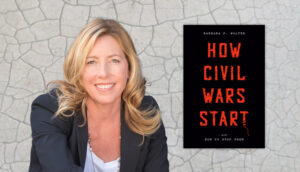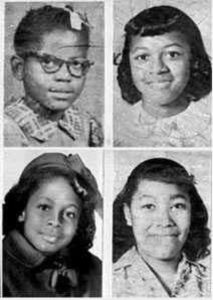 Let’s do a little time travel experiment.
Let’s do a little time travel experiment.
The year is 2003. George W. Bush is president; the space shuttle, Columbia, explodes on its return to earth, killing all seven astronauts on board; Finding Nemo is the biggest film of the year; and you are twenty years younger.
Or maybe we should go back to 2013. The United States has elected the first black president in its history; terrorists set off a bomb at the Boston Marathon, killing three people and injuring nearly 300; Macklemore has two of the five biggest songs of the year; and you are ten years younger.
Now, imagine that in 2003 or 2013, someone were to tell you that in 2023—just ten or twenty years in the future—roughly half of the country would support a man for president who:
- Had been divorced three times;
- Had declared bankruptcy five times;
- Was prohibited from owning or serving on the board of a charitable foundation in the State of New York because he had misused funds from his own foundation;
- Had admitted to committing sexual assault;
- Had been impeached twice while serving as president, once for trying to extort the leader of a friendly nation and once for inciting an insurrection;
- Had refused to accept the results of an election, and continues to spread the Big Lie that, due to voter fraud, the election was stolen from him.
- Had been indicted in four different jurisdictions for a total of 91 felony charges;
- Had called for the execution of a former head of the Joint Chiefs of Staff and the imprisonment, without evidence of wrongdoing, of his political opponents;
- Has promised that if he is elected again to the presidency, he will institute an authoritarian form of government that includes jailing political opponents and those not sufficiently loyal to him; will fire career government employees, replacing them with cronies loyal only to him, not the nation; will remove the United States from NATO, the most successful mutual support alliance organization in history; and will weaponize the government to benefit his friends and punish his enemies.
If you had been given this information in 2003 or 2013, would you have believed it?
If you’ve followed this blog for the past few years, you know that I have struggled to understand how anyone, let alone half the nation, could support Donald Trump, a man his own former Chief of Staff (and retired U.S. Marine Corp General) called the most flawed man he had ever met. A Trump-supporting friend once told me in 2020 that the reason he and other people support Trump is because the former President’s policy preferences matched their own. I couldn’t understand it in 2020, considering everything we knew about Trump at the time, and I certainly can’t understand it now.
Of course, I’m not the only one who struggles to understand the appeal of Donald Trump. Below, I’ve included perspectives from three different people, including:
- A British writer who doesn’t understand how so many Americans have been duped by Trump;
- A political pundit and business owner from Arizona who thinks that calling Trump supporters “stupid” is kinder than saying what those people might actually be: and
- A small church minister in New York who recounts what it was like to have his congregants pervert Biblical teachings to justify supporting Trump.
They, like me, are confused about the sway Donald Trump continues to have over the Republican Party, and how he has transformed the GOP into an anti-democratic, pro-authoritarian political organization.
I will say, I don’t mind people calling Trump names. I do it myself. But I have to admit that it bothers me to see his supporters—at least some of his supporters—called stupid or ignorant. Some of these people, at least some of the ones I know, are not stupid. I can’t fully explain their attraction to such a cartoonish buffoon, but the Trump supporters I know are decent people who care about their families, communities, states, and the nation. I don’t think they personally wish ill on anyone. Yet, they support a man for the highest office in the land who absolutely wishes ill on many Americans and wants to end the democracy that has served us so well. In many cases, these people self-identify as Jesus-following Christians, yet they support a man who is as un-Christ-like as any man to ever hold the presidency. I just don’t get it.
The first article was written by Nate White and was originally published in the London Daily. White is a British writer and his article explains why Brits dislike Trump. It’s humorous, but everything White says is factual.
The next article originated as a Twitter thread written by Ryan Shead, a political pundit and business owner from Arizona. In his thread, Shead sets out to answer the question, why do liberals think Trump supporters are stupid? As I said, it bothers me to hear Trump supporters referred to as stupid, but there’s no arguing with the examples Shead provides. There’s just no explaining why otherwise smart, decent people approve of the things Trump says and does.
The final article also originated as a Twitter thread written by Rev. Sean Muldowney, a small church pastor who speaks to the changes he saw in his congregation that paralleled Trump’s political rise. Rev. Muldowney’s words really struck me because he describes exactly what I witnessed: otherwise decent people sucked in by a con artist posing as a Christian. Muldowney’s Twitter thread is a disturbing, but enlightening read.
Why Do British People Not Like Donald Trump?
(Lightly edited for clarity)
A few things spring to mind. Trump lacks certain qualities which the British traditionally esteem. For instance, he has no class, no charm, no coolness, no credibility, no compassion, no wit, no warmth, no wisdom, no subtlety, no sensitivity, no self-awareness, no humility, no honour and no grace – all qualities, funnily enough, with which his predecessor Mr. Obama was generously blessed. So for us, the stark contrast does rather throw Trump’s limitations into embarrassingly sharp relief.
Plus, we like a laugh. And while Trump may be laughable, he has never once said anything wry, witty or even faintly amusing – not once, ever. I don’t say that rhetorically, I mean it quite literally: not once, not ever. And that fact is particularly disturbing to the British sensibility – for us, to lack humour is almost inhuman. But with Trump, it’s a fact. He doesn’t even seem to understand what a joke is – his idea of a joke is a crass comment, an illiterate insult, a casual act of cruelty.
Trump is a troll. And like all trolls, he is never funny and he never laughs; he only crows or jeers. And scarily, he doesn’t just talk in crude, witless insults – he actually thinks in them. His mind is a simple bot-like algorithm of petty prejudices and knee-jerk nastiness.
There is never any under-layer of irony, complexity, nuance or depth. It’s all surface. Some Americans might see this as refreshingly upfront. Well, we don’t. We see it as having no inner world, no soul. And in Britain we traditionally side with David, not Goliath. All our heroes are plucky underdogs: Robin Hood, Dick Whittington, Oliver Twist. Trump is neither plucky, nor an underdog. He is the exact opposite of that. He’s not even a spoiled rich-boy, or a greedy fat-cat. He’s more a fat white slug. A Jabba the Hutt of privilege.
And worse, he is that most unforgivable of all things to the British: a bully. That is, except when he is among bullies; then he suddenly transforms into a sniveling sidekick instead. There are unspoken rules to this stuff – the Queensberry rules of basic decency – and he breaks them all. He punches downwards – which a gentleman should, would, could never do – and every blow he aims is below the belt. He particularly likes to kick the vulnerable or voiceless – and he kicks them when they are down.
So the fact that a significant minority – perhaps a third – of Americans look at what he does, listens to what he says, and then think ‘Yeah, he seems like my kind of guy’ is a matter of some confusion and no little distress to British people, given that:
- Americans are supposed to be nicer than us, and mostly are.
- You don’t need a particularly keen eye for detail to spot a few flaws in the man.
This last point is what especially confuses and dismays British people, and many other people too; his faults seem pretty bloody hard to miss. After all, it’s impossible to read a single tweet, or hear him speak a sentence or two, without staring deep into the abyss. He turns being artless into an art form; he is a Picasso of pettiness; a Shakespeare of shit. His faults are fractal: even his flaws have flaws, and so on ad infinitum. God knows there have always been stupid people in the world, and plenty of nasty people too. But rarely has stupidity been so nasty, or nastiness so stupid. He makes Nixon look trustworthy and George W look smart. In fact, if Frankenstein decided to make a monster assembled entirely from human flaws – he would make a Trump.
And a remorseful Doctor Frankenstein would clutch out big clumpfuls of hair and scream in anguish: ‘My God… what… have… I… created?’ If being a twat was a TV show, Trump would be the boxed set.
— Nate White
Twitter Thread from Ryan Shead
(Lightly edited for clarity):
THIS WAS ON A FRIEND’S PAGE: An anguished question from a Trump supporter: ‘Why do liberals think Trump supporters are stupid?’
THE SERIOUS ANSWER: Here’s what the majority of anti-Trump voters honestly feel about Trump supporters en masse:
That when you saw a man who had owned a fraudulent University, intent on scamming poor people, you thought “Fine.”
That when you saw a man who had made it his business practice to stiff his creditors, you said, “Okay.”
That when you heard him proudly brag about his own history of sexual abuse, you said, “No problem.”
That when he made up stories about seeing Muslim-Americans in the thousands cheering the destruction of the World Trade Center, you said, “Not an issue.”
That when you saw him brag that he could shoot a man on Fifth Avenue and you wouldn’t care, you exclaimed, “He sure knows me.”
That when you saw him mock the disabled, you thought it was the funniest thing you ever saw.
That when you heard him brag that he doesn’t read books, you said, “Well, who has time?”
That when the Central Park Five were compensated as innocent men convicted of a crime they didn’t commit, and he angrily said that they should still be in prison, you said, “That makes sense.”
That when you heard him tell his supporters to beat up protesters and that he would hire attorneys, you thought, “Yes!”
That when you heard him tell one rally to confiscate a man’s coat before throwing him out into the freezing cold, you said, “What a great guy!”
That you have watched the parade of neo-Nazis and white supremacists with whom he curries favor, while refusing to condemn outright Nazis, and you have said, “Thumbs up!”
That you hear him unable to talk to foreign dignitaries without insulting their countries and demanding that they praise his electoral win, you said, “That’s the way I want my President to be.”
That you have watched him remove expertise from all layers of government in favor of people who make money off of eliminating protections in the industries they’re supposed to be regulating and you have said, “What a genius!”
That you have heard him continue to profit from his businesses, in part by leveraging his position as President, to the point of overcharging the Secret Service for space in the properties he owns, and you have said, “That’s smart!”
That you have heard him say that it was difficult to help Puerto Rico because it was in the middle of water and you have said, “That makes sense.”
That you have seen him start fights with every country from Canada to New Zealand while praising Russia and quote, “falling in love” with the dictator of North Korea, and you have said, “That’s statesmanship!”
That Trump separated children from their families and put them in cages, managed to lose track of 1500 kids, has opened a tent city incarceration camp in the desert in Texas – he explains that they’re just “animals” – and you say, “Well, OK then.”
That you have witnessed all the corruption and lacking moral character, rudeness and contempt for you, the working American voter, and you still show up grinning and wearing your MAGA hats and threatening to beat up anybody who says otherwise.
That when Trump scammed $122 million from everyday Americans for his 2020 campaign — folks who were literally on Hospice waiting to pass — you said, “Trump 2024.”
That when Trump added $7.8 trillion to the national debt after promising to lower it, you said, “he just needs another four years”
That when the trade deficit increased by 40% under Trump, you said, “it would be worse under the Democrats”
That when Trump had the worst jobs record since President Hoover, you said, “four more years.”
That when Trump said he would be too busy working for the American people to go golfing while doing so for a year of his presidency on his own properties, you said, “that’s just smart business.”
That when Trump said everyone would have better and cheaper healthcare once he was elected while 2.3 million more people become uninsured, you said, “the polling is wrong.”
That after Trump said “It’s 15 people and pretty soon it will be down close to zero” Covid cases in the United States, and 400,000 Americans died from it, you said, “who could have predicted?”
That when we found out Trump expressed support for hanging VP Mike Pence during the January 6th Capitol riot, you thought, “He kinda had it coming”
That when Trump said he’s ‘financially supporting’ January 6 defendants and will look ‘very favorably’ about full pardons if he wins the 2024 election, you said, “That’s a real leader”
That when the January 6th Committee presented video testimony from ex-attorney general William Barr saying the former president’s claims of election fraud were ‘bogus’, ‘idiotic’ and ‘bullshit’, you thought, “The libs are just trying to take Trump down.”
That when you heard that Rudy Giuliani said “We have lots of theories, we just don’t have the evidence,” to support the claims of election fraud, you said, ‘Rusty Bowers is a traitor’
What you don’t get is that our succumbing to frustration, thinking of you as stupid, may very well be wrong, but it’s also…hear me…charitable.
Because if you’re NOT stupid, we must turn to other explanations, and most of them are less flattering.
— Ryan Shead
Twitter Thread from Rev. Sean Muldowney
(Lightly edited for clarity):
That politician got arrested today. I’ve been reflecting on how I’ve pastored people since late 2015.
Spoiler: lots of failure.
It’s late 2015/early 2016, preceding the presidential election and into the new presidency.
I, like others, observe a rising sentiment among the faithful Christians most immediate to me. This sentiment is a conflation of political aspirations with the will of God.
I observe some good and kind people become supportive of a wealthy celebrity bully who exploits women, minorities, migrant workers, and consumers. His sexual exploits are particularly loathsome.
I grew up in the tri-state area and read the New York newspapers almost every day of my life. I knew what this guy was about since I was 12 years old.
And now he was beginning to exploit Christians for their political support under the pretense of shared values like morality and law-and-order… values that he has not practiced one day in his public life.
Some good and kind people near me soon become somewhat obsessive and defensive over him. It is beginning to look grim. The category of “following Jesus” does not seem to apply to these conversations. Even notions of “decency” and “honor” don’t seem to apply to these conversations.
What started out as a seemingly benign “well he’s just the lesser of two evils” sentiment rapidly evolves into full-blown religious syncretism. Support for this bully is fully equated with doing the will of God.
His personal life doesn’t matter, his ethics don’t matter, his integrity doesn’t matter. Those are all washed away with a few words: “God can use anyone.”
I see through the veil. I don’t know why it’s apparent to me, but it is.
So I’m wanting to speak up about this because it has become a complete spiritual crisis. It has become idolatry. Idolatry is the very thing that is the most dangerous to our souls. No, nobody would outright claim to ‘worship’ this man. But the fawning over him and the defense of him has all the markings of uncritical spiritual devotion that could be easily exploited… and would likely lead to violent outbursts somewhere down the road (“cultish” would be a technically appropriate word to use).
As I witness these things take place — all in the name of Jesus and in the name of being pro-life — I want to speak up. Pastors push back against idolatry, right? Pastors don’t let people create a god in their own image, right? Pastors warn the people under their care about “strong delusions” (2 Thess. 2:11), right?
I want to be helpful, but also maintain credibility. Maintain a peaceable tone. Withhold judgment. Not offend. Make it far less about who one chooses to vote for and far more about the mingling of spirituality with partisanship and populism (I still believe this).
I speak up, as I can, never feeling like I hit the mark. Never feeling like it’s sufficient. Never feeling pastoral enough or gentle enough. Or bold enough or courageous enough. And I’m thinking “nobody else is seeing this as a discipleship issue. Am I wrong? Biased? Stupid? Do we just ignore this so as to not make waves and rock the church?” (That seemed to be the unspoken expectation in the church. I’m the associate pastor in this story, btw).
I have this internal crisis all while seeing some good and kind people become fully seduced by a classic strong-man bully who parrots enough god-talk to win over the historic “moral majority” crowd. I feel defeated as I see people sell their souls to a scam artist. What a shitty pastor I must be, to open scripture so often for people but not be able to help them see that they are dancing in darkness. But hey, at least they check the “fully engaged church member” boxes!
So it’s enough that I’m failing in speaking up about this AND a related “racism is bad” concern (that was a whole thing that should have been obviously ok, but wasn’t).
THEN I learn that my speaking up has caught me a label: “You’re a raging ________” (I bet you can guess).
That was definitely a first. Along with getting reported to a supervisor for my “agenda.” Along with a secret task-force investigation of my social media (though I was cleared of whatever it was that was garnering complaints).
How did I think I was fairing as a pastor, as someone meant to keep watch over people’s souls?
Failure, everywhere.
Now here we are nearing the end of 2023. I am no better a person for my attempts to speak up. I don’t claim to hold any moral high ground. My direct critique of one seductive political figure is hardly an endorsement for the other side, but that’s not how I’ve been interpreted.
I’ve been humbled. I don’t think my voice mattered and I don’t think I made a difference. I don’t think I helped anyone move out of the political haze and into the presence of Jesus. (I’m pretty sure I’m totally shutting my mouth this coming election season… or going full IDGAF, we’ll see.)
The point? It’s not actually about me or what I did or didn’t do, I’m finally realizing.
Reality is reality. What a multitude saw coming did indeed come. And it is still unfolding.
Seems like “persecution/martyrdom” is the next act in this antichrist soap opera.
But you know what? There’s still time to repent, to get off of this train to nowhere, and return to authentic faith in the true Savior. The one who willingly laid down power and embraced weakness.
The one who could have declared religious war on his enemies but instead humbled himself on a cross. The one who invites sinners to his table and empowers them to live a new and different way of life.
Otherwise… behold, your god. Behold, your idol.

As for me? I’ve grown in security. I’ll lose my job. I’ll lose my credibility. I’m calling out syncretism and idolatry. I’m not standing for theonomy or nationalism. I’m not bowing the knee to false Christianity.
It’s about discipleship and imitating Jesus, or it isn’t.
I’m not usually tweeting/x’ing like this, so the full on vulnerability hangover from this thread is pretty well settling over me.
So, in an effort to soothe my fragile ego, I want to add a contextual note about the language I used.
I hope you caught that I purposefully described “good and kind” people who were seduced by this delusion. That wasn’t me being cute. That’s the truth. That’s who they are. That’s what made it all the more heartbreaking: to see them take on an identity that wasn’t theirs.
I was serving in a large-ish rural church. I was a first-generation Christian (at age 19) city boy who was ministering in a 200+ year old church where the generations ran up to 4 deep. I got close to farmers, truckers, sporting goods magnates, factory workers, educators, nurses, and business owners.
Side note: farmers are the most amazing people and are doing one of the most dangerous jobs. No farmer is only a farmer. A farmer is a farmer and an engineer and a mechanic and a trucker and a weatherperson. They’re on the cutting edge of technology and steeped in tradition. Farming is among the professions with the highest suicide rates. They’re at the mercy of supply and demand, government policy, the weather, and a host of other variables. All so you and I can eat the food we eat. Go thank a farmer.
So, I showed up needing to learn a whole new culture. My education included why rural communities were drawn to Trump on a *policy* level. There were some real benefits.
And also why they were drawn to Trump on an *emotional* level. They believed he really saw and valued them. That’s why NONE of my story is about “Trump voters.” I don’t ask people how they vote and don’t try to influence people how they vote.
My story is about good and kind people who fell into a trap, put their whole identity into advocating for a criminal, and called it Christianity.
I was not a martyr or a lone voice among a whole MAGA mob. I detected a subtle undercurrent of unhealthy and un-Christlike speech and posture among some people in our community. It was when I challenged that undercurrent that it felt like a rogue wave unleashed.
It wasn’t everyone. But the loud voices were VERY LOUD and the defensive posture was VERY DEFENSIVE and no amount of “here’s the bible open in front of us and can you please show me where you are drawing your perspective from?” conversations seemed to be helpful.
All this to say, I don’t want my story to contribute to “othering” people. When I would speak up, it usually had to do with hearing someone make a disparaging remark about “those people.” There is a real temptation to “other” the people who “other” in the name of decency. No.
That story was about people I cared for (and still care about). People who were swept up in a deluge. People who lost the ability to discern between true and false faith.
Please don’t read any stereotypes of any people or groups into that story.
–Rev. Sean Muldowney

 Today, my son turns 24. I originally wrote this post back in 2021, but thought it was appropriate to re-post it today for his birthday. Happy Birthday, Louis!
Today, my son turns 24. I originally wrote this post back in 2021, but thought it was appropriate to re-post it today for his birthday. Happy Birthday, Louis!
 “We few, we happy few, we band of brothers;
“We few, we happy few, we band of brothers; Let’s do a little time travel experiment.
Let’s do a little time travel experiment.
 Last
Last In 2016, after 28 years of marriage, I got divorced. As my marriage was unraveling, I had it in my mind that I would never get married again. I viewed myself as a rugged individualist, the kind of guy who could happily go through life on his own, without need of a romantic relationship, to be a fully realized, happy human being. I was wrong.
In 2016, after 28 years of marriage, I got divorced. As my marriage was unraveling, I had it in my mind that I would never get married again. I viewed myself as a rugged individualist, the kind of guy who could happily go through life on his own, without need of a romantic relationship, to be a fully realized, happy human being. I was wrong. This post was originally published on August 5, 2021.
This post was originally published on August 5, 2021. Have you ever had a complete stranger change your life? It happened to me, and I want to share the story of how it happened. It’s a story I’ve never told, but one that I think is important.
Have you ever had a complete stranger change your life? It happened to me, and I want to share the story of how it happened. It’s a story I’ve never told, but one that I think is important. The Union won the war, at least in theory. The Confederate Army was defeated, but the southern states carried on as if they hadn’t lost. Confederate officials continued to run things in the south, and black Americans, now freed from bondage—again, in theory—continued to be mistreated and denied their Constitutional rights. Lincoln had a plan to free the slaves, but how he planned to incorporate them into the larger society was murky at best. Then, he was assassinated.
The Union won the war, at least in theory. The Confederate Army was defeated, but the southern states carried on as if they hadn’t lost. Confederate officials continued to run things in the south, and black Americans, now freed from bondage—again, in theory—continued to be mistreated and denied their Constitutional rights. Lincoln had a plan to free the slaves, but how he planned to incorporate them into the larger society was murky at best. Then, he was assassinated. A little over a year ago, I published a post entitled
A little over a year ago, I published a post entitled  Today marks the 60th anniversary of the bombing of the Sixteenth Street Baptist Church in Birmingham, Alabama and the death of four young black girls, Addie Mae Collins, Cynthia Wesley, Carole Robertson and Carol Denise McNair. Birmingham was no stranger to bombings. Between 1947 and 1965 there for fifty separate bombings of homes, businesses, and churches in the town that came to be known as “Bombingham.”
Today marks the 60th anniversary of the bombing of the Sixteenth Street Baptist Church in Birmingham, Alabama and the death of four young black girls, Addie Mae Collins, Cynthia Wesley, Carole Robertson and Carol Denise McNair. Birmingham was no stranger to bombings. Between 1947 and 1965 there for fifty separate bombings of homes, businesses, and churches in the town that came to be known as “Bombingham.”